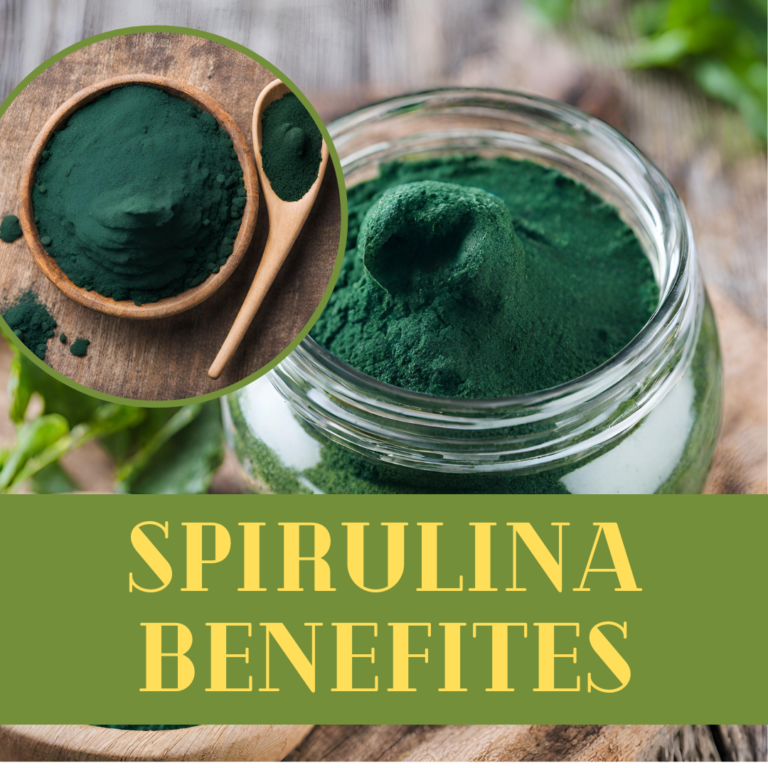Spirulina Benefits for the Health: A Nutrient-Packed Superfood for Immunity
In today’s fast-paced world, it’s essential to prioritize your health and well-being. One way to do that is by including nutrient-dense superfoods in your diet. Among these, spirulina stands out as a powerhouse of health benefits. In this comprehensive guide, we’ll explore the remarkable advantages of spirulina, from its impact on innate immunity to its versatile forms and beyond.
Introduction – Spirulina Benefits
In recent years, the health and wellness industry has witnessed an upsurge in the popularity of superfoods. These are foods with exceptional nutritional value, often linked to numerous health benefits. Spirulina, a type of blue-green algae, has garnered significant attention due to its extraordinary nutrient content and potential advantages for human health.
What Is Spirulina?
Spirulina is a microscopic, spiral-shaped alga that thrives in both saltwater and freshwater environments. It’s often available in various forms, including Spirulina Powder, Tablets, and Spirulina Capsules, making it convenient for different dietary preferences.
Nutritional Profile
It’s a nutritional powerhouse, packed with vitamins, minerals, and essential nutrients. It’s a rich source of protein, containing all the essential amino acids our body needs. Moreover, it’s a potent source of several vitamins and minerals, including vitamin B12, iron, and beta-carotene, making it a valuable addition to vegetarian and vegan diets.
Spirulina’s Historical Use
The history of spirulina dates back centuries, with records of its use by ancient civilizations such as the Aztecs and the Kanem Empire. These cultures recognized its nutritional value and used it as a reliable food source.
The Science Behind Spirulina
Modern science supports the health benefits of Green Powder. Research has shown that it contains powerful antioxidants, including phycocyanin, which can help combat oxidative stress in the body.
Boosting Innate Immunity
One of the standout benefits of spirulina is its ability to boost innate immunity. Innate immunity is our first line of defense against pathogens. Its unique compounds enhance the activity of natural killer cells and macrophages, making it an excellent choice for those looking to strengthen their immune system.
The Versatile Forms of Spirulina
Spirulina is incredibly versatile. It’s available in various forms, allowing you to choose the one that suits your preferences. You can add spirulina powder to smoothies, while tablets and capsules provide a convenient way to incorporate it into your daily routine.
How to Incorporate Spirulina into Your Diet
Including spirulina in your diet is simple. You can mix spirulina powder into your morning smoothie or sprinkle it on salads for an added nutrient boost. Tablets and capsules can be taken with water or your favorite beverage.
Spirulina in Different Cultures
It’s not limited to a particular region. Its popularity spans the globe, and it is enjoyed by people from various cultures. In India, for instance, it is known as “Spirulina” and holds a special place in traditional medicine.
Choosing the Right Spirulina Product
When selecting a spirulina product, it’s crucial to consider its source and quality. Look for reputable brands that provide organic spirulina, as this ensures the absence of harmful contaminants.
Potential Side Effects
While spirulina is generally safe, some individuals may experience mild side effects, such as digestive discomfort. It’s advisable to start with a small dosage and gradually increase it to allow your body to adjust.
Spirulina and Sustainability
As we focus on our health, it’s essential to also consider the environment. It is not only a nutritious superfood but also an eco-friendly one. Its cultivation has a lower environmental footprint compared to many other protein sources.
Conclusion
Incorporating spirulina into your daily diet can be a game-changer for your health. Its impressive nutritional profile, the ability to boost innate immunity, and versatility make it a standout superfood. Whether you prefer it in Hindi, Tamil, or any other language, spirulina offers health benefits that transcend borders.
FAQs
- Is spirulina a good source of protein for vegetarians and vegans? Yes, spirulina is an excellent source of plant-based protein and contains all essential amino acids.
- Can spirulina help with weight loss? While it’s not a weight loss miracle, spirulina’s nutritional value can support a balanced diet and exercise routine.
- Are there any age restrictions for consuming spirulina? Spirulina is generally safe for individuals of all ages. However, it’s best to consult with a healthcare professional for specific dietary recommendations.
- How much spirulina should I take daily for optimal health benefits? The recommended dosage can vary, but starting with a small amount, such as 1-3 grams per day, is a common practice.
- Is spirulina sustainably produced? Yes, spirulina is considered an environmentally friendly protein source due to its low environmental impact during cultivation.

